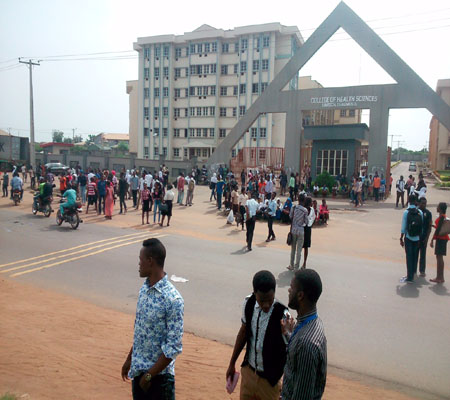Interpol Reports: Hundreds of Dollars Laundered Every Hour in Nigeria
According to an investigation by the International Police Organisation, hundreds of thousands of dollars are laundered out of Nigeria every hour around the world.
Garba Umar, Interpol Vice President for Africa, made this statement in Abuja on Monday while opening a four-day training course for Nigerian law enforcement agencies at the Economic and Financial Crimes Commission (EFCC) Academy.
According to Umar, money laundering in Africa and around the world has reached a monstrous level, and Interpol has developed Silver Notices to address the problem.
Evidence has proved that every hour, hundreds of thousands of dollars are pouring out of Nigeria to the region and around the world, laundered before it enters the wallets of criminals to enjoy the spoils of their crimes, while industrious and honest Nigerians pay the price of crime.
“Every successful laundering of criminal money makes our country more vulnerable to criminality. More narcotics, fraud, corruption, and violence. “Every time criminal money is successfully laundered, our financial institutions suffer an additional blow,” he stated.
He warned that money launderers would face difficult times since the Silver Notices would make it more difficult to launder illicit monies anywhere in the world.
Speaking on the theme of the Workshop: Strengthening Capacity and Coordination against Financial Crimes, Umar pointed out that financial crimes had become transnational, and law enforcement agencies needed continuous training for its workers to keep up with fraudsters.
He urged workshop attendees to make it their responsibility to discuss and learn about transnational crimes affecting their regions, identify potential solutions through a review of policing capabilities to support the country, and facilitate direct and in-person interaction among law enforcement networks across the country.
“In essence, this Workshop will allow us to re-examine the challenges of fighting transnational crimes in the country, reassess our strategies, and reaffirm our determination and unity as a country to provide security to our citizens and by extension the global community,” according to him.
Umar charged the workshop attendees to take collaboration with other law enforcement agencies seriously, to enhance their investigations, and to ensure that criminals do not reap the benefits of their efforts.
“The only way we can move forward as a country is to work together to identify common problems, devise solutions, and take coordinated and cohesive action.” And now is the moment to go far, united, he said.
In his goodwill message, EFCC Executive Chairman Ola Olukoyede emphasized the importance of increased collaboration in combating financial crime.
He emphasized that the complicated nature of corruption around the world could only be broken via the power of coordinated effort by all stakeholders. “The daunting nature of the fight against corruption in Nigeria and the world at large deserve serious collaboration among organizations saddled with the responsibility of fighting corruption” , according to him.
Olukoyede, who spoke through the Director, Fraud Risk Assessment and Control, FRAC, of the EFCC, Francis Usani, appraised the pivotal role of the EFCC in tackling corrupt practices, especially its impressive records of convictions and recoveries, and expressed optimism that with the new emphasis on the preventive framework in tackling financial crimes by the commission, greater progress would be made.
“Our records of convictions and recoveries stand us out, but we will not rest on our oars, we are committed to doing more and in this commitment, the EFCC is re-strategising its operations with a focus on prevention knowing that it is easier and cheaper to prevent corruption from happening than investigating and prosecuting corruption,” he said.
In his remark, Ambassador Extraordinary and Plenipotentiary of Japan to Nigeria, Kazuyoshi Matsunaga, described the workshop as an important joint initiative between Japan and Nigeria to combat financial crimes.
He explained that in the contemporary globalised world, financial crimes transcended borders and required international cooperation among law enforcement agencies to combat them.
I am glad that INTERPOL and the Japanese National Police Agency are lending their knowledge to this effort. A unique collaboration occurred three years ago when Japanese and Nigerian law enforcement organizations successfully returned a sum to a Japanese fraud victim, generating enormous goodwill. Strengthening our collaboration through this project will benefit not only Nigerians but people all across the world, especially the Japanese,” he stated.
Hafsat Bakare, Director General and Chief Executive Officer of the Nigerian Financial Intelligence Unit, NFIU, spoke about the imperative of strengthening capacity and coordination against financial crimes, stating that “financial intelligence and financial analysis techniques are key to tackling economic crimes.”
The NFIU, she said, was sensitive to the interconnected nature of the criminal justice system, the threat of organised crime, and cybercrimes being fought by law enforcement agencies.
She expressed optimism that the training law enforcement officers would receive at the Workshop would “ sustain efforts being made to ensure that Nigeria exits the Grey List of the Financial Action Task Force possibly by mid-2025.”
The Director of Interpol Financial Crime and Anti-Corruption Centre (IFCACC), Isaac Oginni, said the only way to disrupt organised crimes was by denying fraudsters the financial profit behind their criminal enterprise. Besides, financial intelligence could also be utilised well when investigators recognise its value and use it to build a financial profile around suspects.
He challenged participants and stakeholders at the workshop to collectively work together and fight money laundering.
With our respective capabilities and missions, each agency represents a unique piece of the puzzle. Each component of the puzzle contributes to the larger picture, and even one missing piece prevents the entire picture from developing,” he explained.
“Today, we will commence the first phase of the Interpol/JICA workshop, a capacity-building project that aims to strengthen Nigeria’s safety through enhancing law enforcement’s capacity to combat financial crime, as well as through increased national cross-agency collaboration and cooperation,” said the man.
The four-day course, the first of its type and held by the EFCC, was organized by INTERPOL and the Japan International Cooperation Agency, or JICA. Participants included representatives from the Police, EFCC, NFIU, Nigeria Immigration Service, and Nigeria Customs Service.
SOURCE CHANNELSTV



